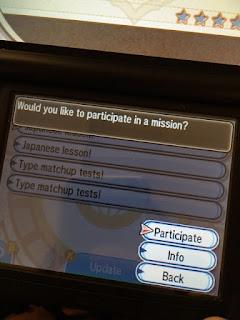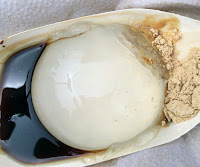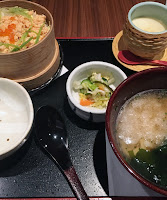Thursday, December 15, 2016
Monday, December 5, 2016
Monday, November 28, 2016
おくりもの(gift)
みなさん、こんにちは!サンクスギビングの休みはよかったですか?The holidays are nearly upon us, so this post is a about gift-giving in Japan.
Gift-giving Occasions
Etiquette
With all that we've learned so far, we can actually translate these phrases ourselves!
Gift-giving Occasions
- 御歳暮(おせいぼ): Gifts that are given at the end of the year.
- 御中元(おちゅうげん): Mid-year/summer gift
- バレンタインデーとホワイトデー: On バレンタインデー, women to give chocolates to men. The chocolates can be 本命(ほんめい)チョコ, the "chocolate of love" that is typically hand-made, or 義理(ぎり)チョコ, "obligatory chocolate." Men return the favor on ホワイトデー, March 14. Reciprocity is often seen in Japanese gift-giving culture.
- ご祝儀(ごしゅぎ): At a Japanese wedding, this is gift money given to the couple. The average ご祝儀 is 30,000 JPY (about $300). It is also customary for the couple to give gifts to the guests, which is known as 引出物(ひきでもの)
- 手土産(てみやげ): A gift that is given when going to someone else's house. Traditional Japanese sweets such as どらやき、だいふく(もち) are common as 手土産。おいしいですね。たべたい…
Etiquette
- Gifts should always be given and received with two hands.
- It’s common for the recipient to decline a gift up to three times before accepting it.
- Timing is important. If you just met someone and gave them a gift, it would seem like you are trying to rush the relationship.
With all that we've learned so far, we can actually translate these phrases ourselves!
- つまらないものですが…:The most formal way to give a gift.
- たいしたものじゃないんですが…: This is a little more informal, but it is still rather polite.
- これ、どうぞ:Less formal and should not be used with expensive gifts.
- えんりょなくいただきます: This is said when accepting a gift. Its literal translation is something like "I humbly receive without hesitation"
Sunday, November 20, 2016
ポケモン・ムーン ☾
おとといポケモン・ムーンは届きました。週末たくさんしました。とても楽しくて、可愛いです!


フェスティバル・プラザに日本語のじゅぎょうがあります。やさしかったですが、おもしろかったです。It just involves finding other characters speaking Japanese :)




フェスティバル・プラザに日本語のじゅぎょうがあります。やさしかったですが、おもしろかったです。It just involves finding other characters speaking Japanese :)


Wednesday, November 9, 2016
PE Reflection
Reflection from the first PE:

毎日とてもねむいです…
Goal Revision:
- I have been watching anime every week and shadowing various phrases. It's been useful for learning new phrases and improving my intonation. I'm also able to hear phrases and vocabulary that we've learned in class more easily, which is exciting!
- I've gone to the Japanese language table about 80% of the time. When I wrote my original activities, I thought I'd be able to make it every week, but the trek from Bloomberg to Mathey is a bit....too far...especially when I have a lot more work this semester than I anticipated (despite only taking 4 classes). I'm more comfortable speaking with others now, but that may be a byproduct of getting to know people better.
- I continue to self-study and review daily, and I practice vocab-specific intonation.
- I have gone to office hours once, but I think I should go more often for speaking practice. I need to improve my ability to have conversations and form sentences on the spot. To be honest, I think it's harder to practice this at the Japanese language table (perhaps the setting is too casual, or there's too many people?), so I will shift my activities focus a bit.

毎日とてもねむいです…
Goal Revision:
- Replace "converse more naturally with others" with "improve ability to have conversations on the spot". This means (1) thinking of the correct grammar structure faster, (2) thinking of the desired vocabulary faster, (3) being able to say it.
- My other goals will not change. I think I have improvement, but (unsurprisingly) it's nowhere near native-level yet
- Try to go to Japanese table at least twice a month rather than every week
- Try to go to (any) sensei's office hours more
Saturday, October 29, 2016
Monday, October 24, 2016
一風堂(いっぷうどう)
せんしゅうのしゅうまつにニューヨークにいきました。はじめて一風堂にいきました。一風堂でラーメンをたべました。とてもおいしかったです!でもたかいです。

そして、MSGでライブイベントをみました。よかったです!


そして、MSGでライブイベントをみました。よかったです!

Tuesday, October 18, 2016
ポケットモンスター サン・ムーン
けさポケットモンスター サン・ムーンのデモがふうきりました!たのしみです!そして、しゃしんをとりました。ここ↓



Release Date:
十一月十八日(じゅういちがつじゅうはちにち)
サンかムーンか…まだわかりません。みんなさんどれはかいますか?
I'm looking forward to it! (^^)




十一月十八日(じゅういちがつじゅうはちにち)
サンかムーンか…まだわかりません。みんなさんどれはかいますか?
I'm looking forward to it! (^^)

- ふうきります(封切ります): to release (e.g. a movie)
- しゃしんをとります(写真を撮ります): to take a picture
- かいます(買います): to buy
Monday, October 10, 2016
にほんのたべもの(ニューヨークに)
(It's not all "classic" Japanese food, but still...おいしいです!These are some photos from the past year. I went to NYC last weekend and ate at a Japanese restaurant, but I forgot to take photos!)


みずしんげんもち と ラーメンバーガー


たこやき と ラーメン


ていしょく と どんぶり


みずしんげんもち と ラーメンバーガー


たこやき と ラーメン


ていしょく と どんぶり
Friday, October 7, 2016
Thursday, October 6, 2016
アクリルキーホルダー
アアァァ!!私のアクリルキーホルダーがとどきました!とても可愛いですね!(´・ω・`) It was shipped to me from Japan...The new one is
on the right (みぎ)!


エイミ
Wednesday, September 28, 2016
きもののスタイル
きょう、 I was on Twitter and saw an interesting tweet showing the differences in kimono
styling between men and women. Although I can't understand any of the
writing, the visuals are clear. I never noticed some of these differences before!
(click the screenshot for a direct link to the Tweet)
I hope to be able to read this one day!
じゃ、また!
Amy
Tuesday, September 27, 2016
にほんご101 Speaking Goals and Activities
Goals:
- Be able to speak faster. This is
important because it not only reflects an improved comfort and ease in
speaking にほんご,
but it also reflects an improved understanding of sentence construction
and vocabulary selection.
- Improve my intonation. Intonation is very
important as different pitches may cause phrases to mean different things.
Sometimes I confuse intonation with intensity while speaking and emphasize words/phrases by speaking louder rather than by changing the pitch.
- Converse more naturally with others. For
me, it's important not just to be able to speak well but to be able to
speak well with others. Oftentimes, I practice phrases by speaking to
myself in my room. With practice, my speaking (in my room) eventually gets
to a point where I feel confident about it, but somehow, I tend to do a
lot worse when actually speaking with others (like in class)....

Activities:
- Go to the Japanese language table every
week in order to practice speaking and listening. Hopefully I can also
learn new phrases at the same time.
- Watch anime and practice transcribing
and shadowing at least one or two short segments per week. My goal is
to learn new phrases and practice speaking and listening at the same time (this will be more intensive).
I'm currently re-watching Gintama (銀魂、one of my favorites),
which has a colorful cast of voice actors, so it should be fun to shadow
some of them. I'm also looking forward to Haikyuu!!'s return in the fall. I will also repeat simple phrases each episode without
pausing the episode (this will be less intensive).
- Self-study: Practice
the phrases we've learned in class on my own and do extra exercises in the Student Activities
Manual in addition to the homework problems. Occasionally (monthly?) read various Japanese texts aloud with a friend who has a strong knowledge of the language (try to learn some kanji at the same time!).
- Go to しばたせんせい's office hours once a month to practice speaking. Perhaps I could compile a list of the phrases I shadowed and bring them or practice the phrases that we've learned in class.
- I also have a playlist of anime music that I'll share here, though I don't want to set any concrete speaking activities related to music because I'm a terrible singer. I'm also a fan of OSTs, which don't usually have lyrics (I'm currently obsessed with Boku no Hero Academia's).
Monday, September 26, 2016
こんにちはせかい
はじめまして。Amyです。
わたしはにほんごのいちねんせいです。プリンストンだいがくのよねんせいです。わたしのせんこうはこうがくです。

アメリカのテキサスからきました。でも、ちゅうごくじんです。
どうぞよろしく!

わたしはにほんごのいちねんせいです。プリンストンだいがくのよねんせいです。わたしのせんこうはこうがくです。

アメリカのテキサスからきました。でも、ちゅうごくじんです。
どうぞよろしく!

Thursday, September 15, 2016
Hello World
はじめまして。Amyです。どうぞよろしく。
I am studying Japanese because I am interested in Japanese culture. I have been watching anime and reading manga since middle school. However, I am also interested in other aspects of Japanese culture such as keigo and gift-giving. I still remember this video of a gift wrap that I saw last year...
I do want to take a trip to Japan in the near future and hope to be able to communicate properly while I'm there. I would love to attend Comiket if possible....and I hope to be able to fully comprehend my 同人誌 one day. I'm excited for the day where I can hold a conversation in Japanese whether it's speaking aloud or through the internet. And, of course, the food.
So far, I've found the speaking to be the most difficult. Although I hear a lot of Japanese being spoken through anime, it's very different and difficult for me to try and reproduce the sounds. I also feel anxious when speaking up in class, but I have been doing so anyways and will continue to try my best so that I can learn the language properly.

I am studying Japanese because I am interested in Japanese culture. I have been watching anime and reading manga since middle school. However, I am also interested in other aspects of Japanese culture such as keigo and gift-giving. I still remember this video of a gift wrap that I saw last year...
I do want to take a trip to Japan in the near future and hope to be able to communicate properly while I'm there. I would love to attend Comiket if possible....and I hope to be able to fully comprehend my 同人誌 one day. I'm excited for the day where I can hold a conversation in Japanese whether it's speaking aloud or through the internet. And, of course, the food.
So far, I've found the speaking to be the most difficult. Although I hear a lot of Japanese being spoken through anime, it's very different and difficult for me to try and reproduce the sounds. I also feel anxious when speaking up in class, but I have been doing so anyways and will continue to try my best so that I can learn the language properly.

Subscribe to:
Posts (Atom)

